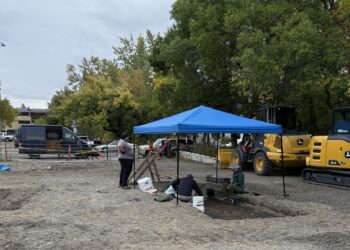The holiday season holds a variety of meanings and experiences regardless of one’s faith, religion or background. It’s a time of year that many believe is supposed to be joyful, and full of good cheer and optimistic hopes.
However, not everyone shares such positive sentiment. Expectations and pressures can feel insurmountable, and the holidays may trigger difficult memories, grief, loss, anger, loneliness and/or sadness. Many factors can contribute to feeling the “holiday blues,” including stress, unrealistic expectations, financial constraints, family tensions, and feelings of loneliness or isolation. Research indicates that the most common stressors acknowledged by people reporting to the emergency room for mental health-related issues during the holiday season are loneliness and not having family.
For many in the resort community, the holidays are one of the busiest times of year. Many jobs require longer hours, a heavier workload, and less flexibility during this season. This can contribute to the inability to be with friends or family. In addition to an increased workload, demands such as shopping, parties, family reunions, and visiting houseguests can contribute to feelings of tension, exhaustion and excess stress, and may lead to the holiday blues or feelings of depression.
What do the holiday blues look like?
In adults, the holiday blues or depression may include sadness, decreased energy or fatigue, loss of interest in activities once enjoyed, inability to think or concentrate, hopelessness, changes in appetite or sleep, stomachaches or headaches, and thoughts of death or suicide. Children and adolescents may exhibit the same symptoms as adults, as well as irritability, aggression, withdrawal from others, and a decrease in academic performance.
People with depression typically describe having several of these symptoms, which can be directly related to the holidays or can last beyond the post-holiday season. More than just the holiday blues, one type of depression that may be more evident during the holiday season is called seasonal depression (or seasonal affective disorder), which typically has an onset in the fall or winter and subsides in the spring or summer.
Although people don’t tend to speak openly about it, depression is actually very common. Nearly 18.8 million American adults suffer from depression, according to the National Institute of Mental Health. It can also affect adolescents and children.
People with depression often don’t ask for help because they think they should pull themselves up by their bootstraps or they wait for it to pass. As well, they may be embarrassed to seek treatment.
Unfortunately, people fear if they talk about feeling down, especially during the holiday season, they will be met with responses like, “you have a lot to be thankful for,” “snap out of it,” or “I’m sure you’re just tired.”
Fortunately, there are many treatments for depression that can be very effective.
Coping with stress and depression during the holidays
The first step in getting help is seeking the assistance of a physician or mental health professional. Friends and family can help with depression by providing support, reassurance and encouragement to seek and stay with treatment.
Also, self-care during this difficult time is critical. This may include: mild exercise, healthy eating, spending time with others rather than alone, postponing major life decisions, confiding in and accepting help from others, prioritizing tasks and responsibilities so they are manageable, and being aware that excessive drinking or substance use can contribute to an increase in feelings of depression.
If someone you know has the holiday blues, be open to talking about it. Let the individual know that you care and make time to understand his or her feelings. With time and the appropriate professional help, those with the holiday blues can feel better.
So, in the midst of this bustling holiday season check in with yourself, family members, friends and others whom you care about. Take notice of how they are doing. Recognize the symptoms of depression in yourself and others, and know that help is available.
Adina Smith, Ph.D. is director MSU’s Human Development Clinic and an Associate Professor in the Department of Health and Human Development at MSU. Stasia M. Owen, MS is a Mental Health Counseling Intern at MSU’s Big Sky Human Development Clinic. To learn more about Big Sky and Bozeman services with the Human Development Clinic or to schedule an appointment call (406) 570-3907.












